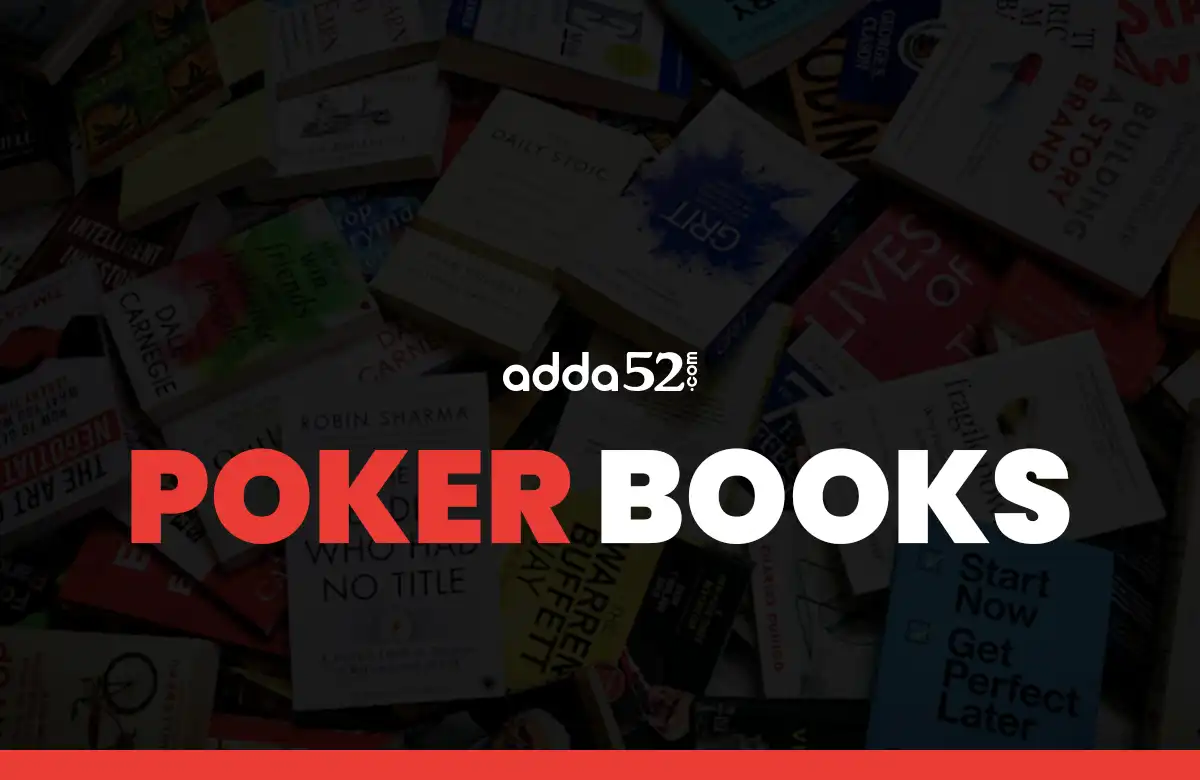
Introduction
Do you want to become a master of Poker?
For players looking to improve their skills, Poker books serve as essential guides filled with knowledge from seasoned professionals and experts.
Here are some great Poker books that bring fresh insights and strategies, perfect for those looking to round out their poker library.
The Best Books About Poker
-
The Theory of Poker by David Sklansky
The Theory of Poker is essential for those seeking to understand the game's complexities. This book explores fundamental Poker concepts such as pot odds, expected value, bluffing, and interpreting opponents' moves. Sklansky's insights into poker theory remain as relevant today as they were when first published.
Best For: Advanced beginners and intermediate players keen on mastering poker strategy.
Key Takeaway: Every move should maximize your expected value. Sklansky explains that understanding the theory behind each action separates casual players from true competitors.
-
Harrington on Hold'em Series by Dan Harrington
Dan Harrington’s three-part series is a must-have for Texas Hold'em tournament players. The series covers hand analysis, tournament stages, positional play, and practical scenarios with real-life applications.
Best For: Players who want an in-depth analysis of adjusting strategy depending on stack sizes and blind levels.
Key Takeaway: Knowing when to shift gears in a tournament and adjust your playstyle can make all the difference in making deep runs.
-
Super System and Super System 2 by Doyle Brunson
Written by Poker legend Doyle Brunson, Super System was one of the first books to reveal professional strategies. The original and its updated version include sections from experts on various forms of poker, from Limit Hold'em to Seven Card Stud.
Best For: Players interested in learning poker fundamentals and versatile strategies for different variants.
Key Takeaway: Aggressive play is often necessary to control the game, put opponents on the defensive, and force mistakes.
-
Every Hand Revealed by Gus Hansen
Gus Hansen brings readers into his mind with a hand-by-hand breakdown of his 2007 Aussie Millions tournament win. His aggressive playstyle and decision-making process offer unique insight into how top players approach every hand.
Best For: Players wanting a close look at a professional’s in-game thought process.
Key Takeaway: Observing Hansen’s loose-aggressive approach can reveal how to apply relentless pressure to opponents and control the table situation.
-
Kill Everyone by Lee Nelson, Tysen Streib, and Kim Lee
This book on Poker is aimed at multi-table tournament (MTT) players and discusses advanced tournament strategies, including bubble play and late-game tactics, in-depth.
Best For: Tournament players focused on advancing past the early stages and dominating at critical moments.
Key Takeaway: Strategic aggression is essential for deep tournament runs, where calculated risks yield the biggest rewards.
-
Poker Math That Matters: Simplifying the Secrets of No-Limit Hold'em by Owen Gaines
If understanding Poker math feels overwhelming, ‘Poker Math That Matters’ simplifies these calculations. This book covers crucial topics like pot odds, expected value, and the mathematical foundation needed to make informed bets. It is particularly useful for low-hold bets, making it a great resource for players using strategies like ‘my bookie low hold bet’ to increase profits.
Best For: Beginners and intermediate players aiming to strengthen their mathematical foundation.
Key Takeaway: A solid understanding of basic math enables you to make more informed decisions, minimize guesswork, and optimize each move.
-
The Mental Game of Poker by Jared Tendler and Barry Carter
This book focuses on psychological aspects, helping players develop emotional control, manage tilt, and maintain focus. Tendler’s approach is based on performance coaching and is ideal for players struggling with mental discipline.
Best For: All levels, especially those prone to emotional outbursts at the table.
Key Takeaway: Mastering the mental game is as crucial as strategic skill. Staying calm and focused under pressure can be a player’s greatest asset.
-
Small Stakes Hold'em by Ed Miller, David Sklansky, and Mason Malmuth.
This book, tailored for low-limit games, helps players maximize profits in small-stakes environments. It focuses on exploiting common beginner mistakes and effectively using tight-aggressive play.
Best For: Players grinding low-stakes cash games.
Key Takeaway: Small-stakes games have unique dynamics, and exploiting typical beginner mistakes can give players a massive edge.
-
Applications of No-Limit Hold'em by Matthew Janda
This book, known for its game theory-focused approach, explains balance, ranges, and advanced concepts in no-limit hold 'em. It is detailed and suitable for those comfortable with high-level poker strategy.
Best For: Advanced players looking for in-depth theoretical insights.
Key Takeaway: Applying game theory to Poker enables players to construct optimal, balanced ranges that withstand exploitative play from opponents.
-
Poker Brat: Phil Hellmuth’s Autobiography
Hellmuth's autobiography provides an unfiltered and enlightening glimpse into the life of one of Poker’s most successful yet contentious personalities. He reveals his triumphs, challenges, achievements, and lessons acquired throughout his poker career.
Best For: Poker enthusiasts and individuals interested in the personalities influencing the game.
Key Takeaway: Phil Hellmuth's self-assurance and determination provide important insights into the power of persistence and belief in oneself, both in Poker and life.
-
Elements of Poker by Tommy Angelo
This book explores Poker philosophy and offers unique insights into tilt, focus, and bankroll management. Angelo’s writing style and wit make complex mental concepts engaging and easy to digest.
Best For: Players interested in the psychology and mental discipline needed for sustained success.
Key Takeaway: Mindset mastery (controlling your emotions and being present)is crucial to long-term success.
-
Winning Low-Limit Hold'em by Lee Jones
This is a highly recommended Poker book for players who want a structured approach to beating low-limit hold 'em games. It covers tight-aggressive play and value betting.
Best For: Beginners and players transitioning from casual to serious play.
Key Takeaway: Small edges can make a big difference in low-limit games, where disciplined and patient play tends to be rewarded.
-
Read 'Em and Reap by Joe Navarro and Phil Hellmuth
Joe Navarro, a former FBI agent, breaks down body language and physical tells in Poker, helping players improve their ability to read opponents at the table.
Best For: Live poker players wanting to hone their observational skills.
Key Takeaway: Observing and interpreting non-verbal cues can reveal valuable information about opponents’ hands and confidence.
-
Modern Poker Theory by Michael Acevedo
This is the best book Poker players can find to learn about GTO (Game Theory Optimal). Acevedo's book combines complex concepts with simulations, charts, and practical applications for cash games and tournaments.
Best For: Advanced players who want to dive into GTO strategy.
Key Takeaway: Understanding GTO allows you to develop unexploitable strategies, especially when facing tough, high-stakes opponents.
-
Secrets of Professional Tournament Poker by Jonathan Little
Little, a well-regarded Poker pro, discusses multi-table tournament (MTT) strategies, emphasizing understanding stack sizes and situational aggression.
Best For: Intermediate and advanced tournament players.
Key Takeaway: Adjusting to changing tournament conditions, such as shifting blinds and player behaviour, is essential for staying competitive as tables evolve.
-
Poker Tournament Formula by Arnold Snyder
Snyder’s book introduces a structured approach to tournament play, specifically for low- and mid-stakes tournaments. He outlines strategies that maximize the chance of making deep runs in fields with recreational players.
Best For: Players wanting to master small to medium-stakes tournaments.
Key Takeaway: Efficient play in tournament formats requires strategic aggression and well-timed risk-taking, especially with smaller fields.
-
Excelling at No-Limit Hold'em by Jonathan Little and other contributors
Little collaborates with top players and coaches like Phil Hellmuth, Chris Moneymaker, and Olivier Busquet, providing insights into varied aspects of Poker, from theory to real-world examples.
Best For: Players at any level looking for broad advice on no-limit hold 'em.
Key Takeaway: Learning from diverse perspectives offers a holistic view of no-limit hold'em, helping players develop a more well-rounded skill set.
-
Ace on the River by Barry Greenstein
Greenstein’s book uniquely blends life lessons and advanced poker strategy. He shares insights from his career and offers advice on maintaining a balanced, successful lifestyle as a professional poker player.
Best For: Intermediate and advanced players or anyone interested in the mindset of a poker professional.
Key Takeaway: Maintaining a balance between Poker and personal life is crucial for long-term success and mental well-being.
-
Play Optimal Poker by Andrew Brokos
This book simplifies game theory for players of all levels. It focuses on applying GTO principles in real Poker situations without overwhelming math. Brokos uses clear explanations and examples to illustrate key concepts.
Best For: Players interested in applying GTO concepts without advanced math.
Key Takeaway: A basic understanding of GTO principles can help players make better, less exploitable decisions, even in day-to-day games.
-
Bluffs by Jonathan Little
In Bluffs, Little dives deeply into bluffing, with practical advice on when, where, and how to bluff effectively. The book is rich with examples and covers strategies for both cash games and tournaments.
Best For: Intermediate players who want to improve their bluffing techniques.
Key Takeaway: Bluffing is an art that requires timing, situational awareness, and an understanding of opponents’ tendencies. When honed, it is a skill that can be a powerful weapon at the table.
Frequently Asked Questions
What is the best book for learning poker?
For beginners, David Sklansky's The Theory of Poker is a great start, offering essential concepts and strategies. Owen Gaines's book Poker Math That Matters simplifies the math involved in the game, while Doyle Brunson's Super/System provides a comprehensive overview of various poker forms.
How to choose the right Poker book?
Choosing the right Poker book depends on your skill level and goals. Good Poker books for beginners cover basic concepts and strategies. Intermediate players might benefit from books focusing on specific formats or advanced strategies. Select books that align with your current needs and aspirations in Poker.
Are Poker books worth reading?
Certainly! Books remain relevant even with the advent of online resources and training platforms. These great poker books provide detailed knowledge and a structured learning approach, allowing readers to understand concepts at their own speed. They offer valuable insights that might be challenging to find in online articles or videos.
Conclusion
Dedicating time to studying Poker books can enhance your skills and grasp of the game. From fundamental theories to advanced strategies, these books offer vast knowledge suitable for players at any stage. Keep in mind that improving as a Poker player is an ongoing journey. Consistent learning through reading and practice will help you stay ahead and achieve lasting success.
